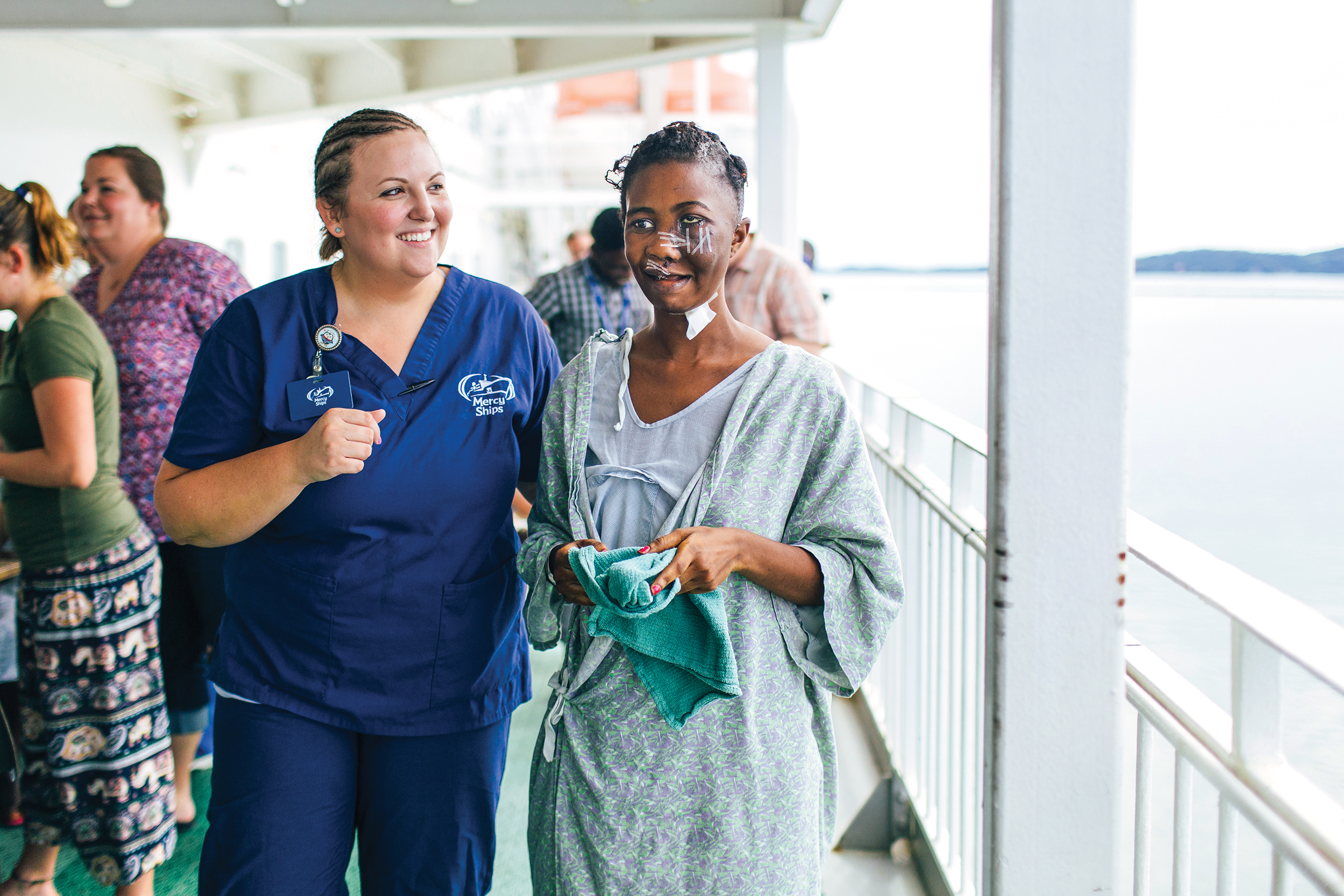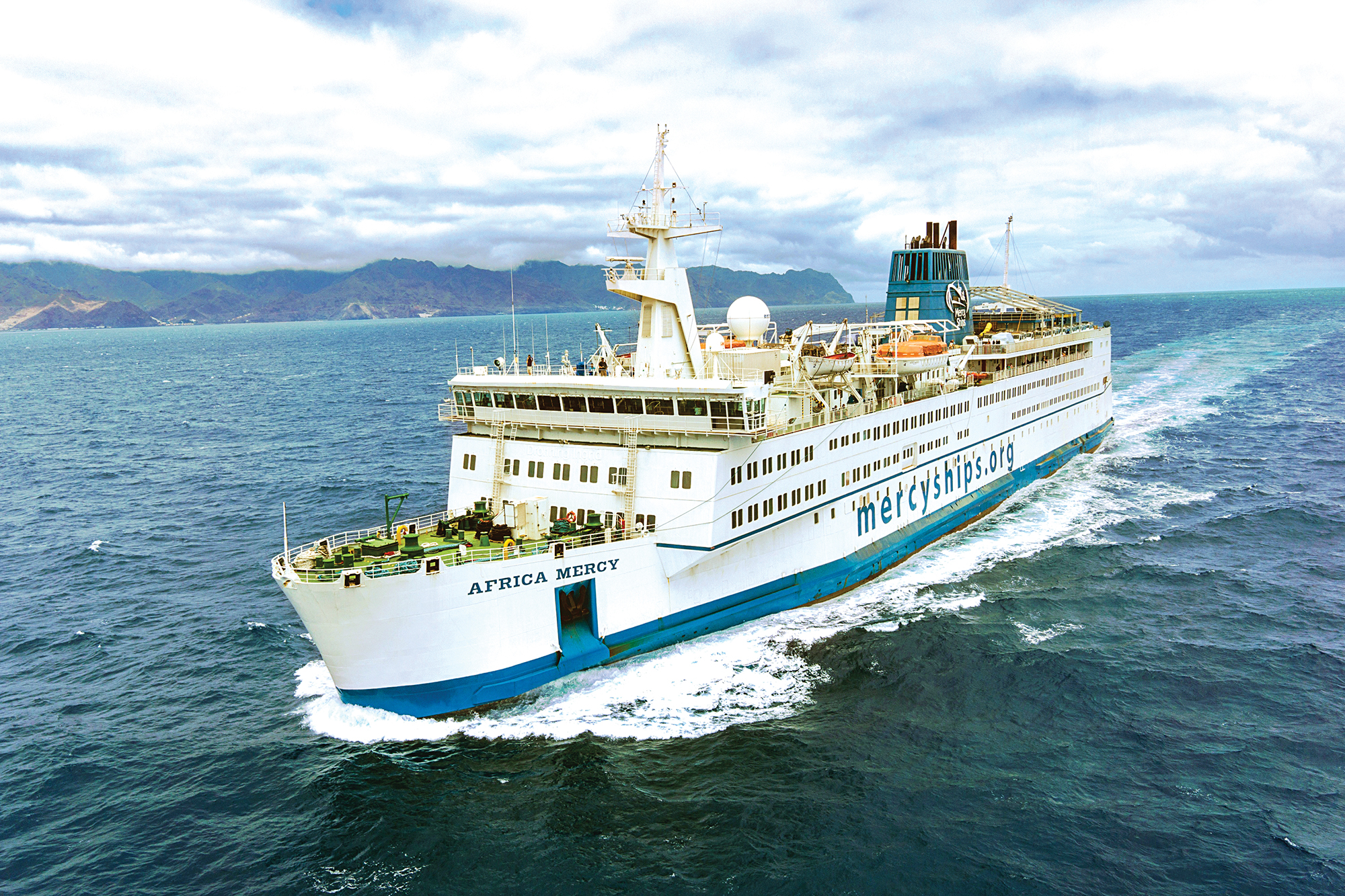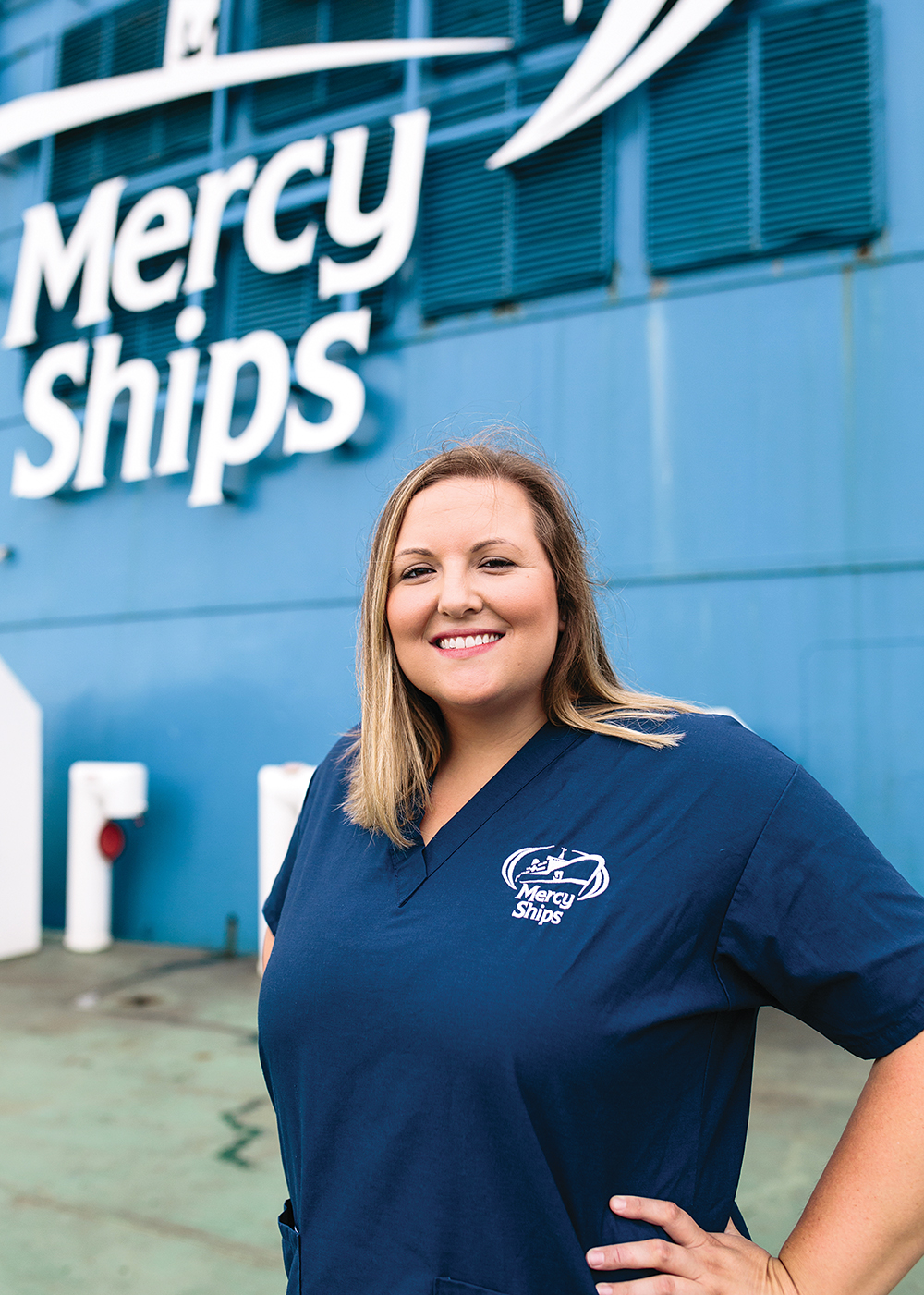Bringing Healing — and Hope
Posted on March 6, 2019
Nurse Sarah Johnson ’10 walks around a deck on the Africa Mercy with a patient named Salematu, who had had a large facial tumor removed. Among her duties while on the hospital ship in Guinea, Johnson helped care for maxillofacial patients before and after their surgeries. (Mercy Ships/Lara Arkinstall)
When Sarah Johnson ’10 landed in Guinea last summer, it wasn’t the first time she had put her nursing at the service of people in Africa. But it was her first time nursing onboard a floating hospital almost as long as two football fields.
From August through December, Johnson served aboard the Africa Mercy of the nonprofit Mercy Ships, an international faith-based organization that uses hospital ships to deliver free medical care and help develop sustainable health care services for people in the developing world. The experience fit into Johnson’s quest since high school to learn about how the rest of the world lives. “That is one reason I had a strong desire to go to UNC-Chapel Hill, because of the strong values and sense of diversity at the school,” Johnson said.
She first traveled to Africa with four other UNC nursing students for a month in 2010 through the global health option in nursing school. She has since participated in medical mission trips to countries such as Nigeria. But Johnson said it took her a while to take the leap and volunteer with Mercy Ships, which would mean taking time away from her job as a high-risk labor and delivery nurse at Vidant Medical Center in Greenville and leaving family and friends for months. The Review contacted Johnson aboard the Africa Mercy in December as she was wrapping up her tour working in an adult ICU and helping care for maxillofacial patients before and after their surgeries.
What was your biggest challenge in doing this work for Mercy Ships?
The skills you learn, you can refine and improve. But the emotional endurance it takes to have the continuous awareness of the major health crises and poverty in these developing nations is challenging. It’s very hard to know that if many of these problems had been addressed in the primary health care setting they would have been identified and hopefully treated before becoming a problem. That’s why we are seeing such a high number in need of these specific surgeries.

The Africa Mercy, which is almost two football fields long and weighs more than 18,000 tons, is the largest private hospital ship in the world. (Mercy Ships)
It makes you very conscious of the waste and lack of appreciation many have for the things and resources that are given to them just by living in America or developed nations. I include myself in that. When you work with patients that struggle to obtain basic needs and live in a community where you share a space and live simply, you realize how many of the things back home really are “wants” and not “needs.”
Onboard Mercy Ships, you develop close relationships with your co-workers and patients very quickly. They become more like family and friends. You are working and living in the same space. The depth of relationships grows and grows. You are also living in a setting where there is a constant movement of people, co-workers and patients. You bond and form a relationship, to one day say goodbye, knowing very well you may not see them again.
Has the experience affected how you do your job back home?
Because you are working with such a diverse community, so many people from so many countries and so many cultures, it opens your mind to different perspectives, different work ethics and different ways to share love with your patients. In general, I think in returning home to my regular job, just like the job here onboard Mercy Ships, it has broadened my capacity to love and care for patients in all health care settings. Also, the very strong sense of community onboard Mercy Ships as well as in West African culture is something to be praised. I hope to bring back that sense of community and teamwork, working for the common good of hope and healing.
Is there a particular story that sticks with you?
There are many stories, but I must tell you of my friend Salematu. Salematu had a massive facial tumor that deviated her facial structure, so much so it caused displacement of her left eye. She came to Mercy Ships seeking out help and hope. She was in nursing school when the tumor started to grow. She dropped out of nursing school and felt ashamed of this growing tumor.

Most of the 400 or so volunteers onboard like Johnson pay their own way for the assignments. (Photo by Shawn Thompson)
Salematu traveled from Sierra Leone to Guinea for the opportunity to have surgery. When I first met Salematu, she was post-op and covered in gauze dressings. There were Steri-Strips and bandages covering her wounds. I had the privilege of seeing her bandages come off. I had the privilege of seeing her brokenness, doubt and fears being removed with each and every dressing change.
Then one day, Salematu saw herself in the mirror — no facial tumor in sight. She cheered, and the joy that showed through her smile was never-ceasing. She made a sign to place above her bed: “Look at my life, can you see what God has done for me.” … She gave glory and thanksgiving to Jesus. Her hope for the future was such an encouragement to patients around her. We would see her brokenness slowly disappear and her sense of empowerment increase. This was a transition we would see with a lot of our patients. Those that were once ashamed and withdrawn from society were now rising up with smiles and pride.
What did you take away from that?
Don’t underestimate the impact of love, hope and kindness. Every person, whether in a developing nation or in America, Muslim or Christian, has basic needs. We are all trying to do this thing called life. It is so much better doing it together. Friendship and community does not mean you have to be the same. If anything, this experience has taught me that it is our differences that enrich our lives and relationships. It’s that awareness that we all require basic needs for living as well as love, hope and kindness to give us joy for living.
Why would you encourage others to volunteer with Mercy Ships?
This is a truly unique community. You are a part of incredible work, working with incredible people from all over the world. Because you have the common goal of hope and healing, you bond quickly and develop relationships that last a lifetime. The richness of the love and gratitude shared among patients and crew members is priceless.
Although Mercy Ships is a Christian organization with the mission statement, “We follow the 2,000-year-old model of Jesus, bringing hope and healing to the forgotten poor,” it is open to a diverse community. Although I’m a Christian, my patients or co-workers may not be. The ultimate goal is to provide hope and healing to the forgotten poor. It’s about working together in a diverse community to achieve some pretty incredible goals and make dreams come true for many of those in the communities we serve.
What will you share from this experience when you return home?
Two things specifically come to mind: the importance of community, and the importance and greatness in a simple smile. The sense of community is so strong in Guinea. You work together. Teamwork is essential for daily life. You cannot do life alone. It is about quality of life and quality of relationships, not the quantity of mass production or stressing to stay busy. There is an African proverb that states: “If you want to go fast, go alone. If you want to go far, go together.”
— Lea Hart
Mercy Ships’ Mission
Mercy Ships’ floating hospitals deliver free, world-class health care to people in developing countries with otherwise little or no access to such services. Through one-on-one mentoring and classroom instruction for large groups, the nonprofit also trains local medical professionals, including surgical teams and support services for local hospitals. And it develops local trainers so that the efforts are sustained when the vessel leaves.
Founded in 1978 by Don and Deyon Stephens, Texas-based Mercy Ships has offices in 16 countries and has worked in more than 70, providing services valued at more than $1.53 billion for over 2.71 million people.
The Africa Mercy — a refitted Danish rail ferry launched in 2007 as the largest of the four hospital ships Mercy Ships has had in its fleet — is crewed at any given time by 400 volunteers from up to 40 nations. An average of 1,000 volunteers each year include surgeons, dentists, nurses and health care trainers but also nonmedical jobs such as teachers, cooks, seamen, engineers and agriculturalists.
Dr. Joel S. Goodwin II ’84 (’90 MD) served two weeks in 2016 on the Africa Mercy in Madagascar. At the time, he was director and an attending physician at a surgery center in Durham and an assistant professor of surgery at UNC’s School of Medicine. He said he began planning a year in advance for the trip and, as a volunteer, he covered not only his own travel costs but paid for room, board and transportation while deployed.
“All of the positions on the ship, with a few exceptions, are self-funded,” Goodwin said. He met physicians from Poland and Hong Kong and nurses from France and Africa, among others.
The floating hospital was equipped with clean water and sterile operating rooms in a country where they are hard to come by. Mercy Ships fundraises from foundations, corporate in-kind gifts, trusts and individual contributors. “It’s pretty inspiring that they’ve figured out how to do all of this,” Goodwin said. Patients “line up in droves. They will do what they can to get this care.”
Goodwin, a general surgeon, said he didn’t do any work in Madagascar that he didn’t do at home, spending most days on hernia surgeries; unlike back home, many people had lived with their hernias for 20 or 30 years. Surgeons also deal with birth defects such as cleft palate or cleft lip in children or facial tumors and facial defects in adults, he said. Another area of great need: women with obstetrical complications from childbirth. Goodwin said estimates show 1 million women in sub-Saharan Africa need such care. “A lot of these things they take care of are heartbreaking,” Goodwin said. “It’s almost like daily miracles.”
Thanks for reading the Carolina Alumni Review
Carolina Alumni members, sign in to continue reading.
Not yet a member? Become one today.
